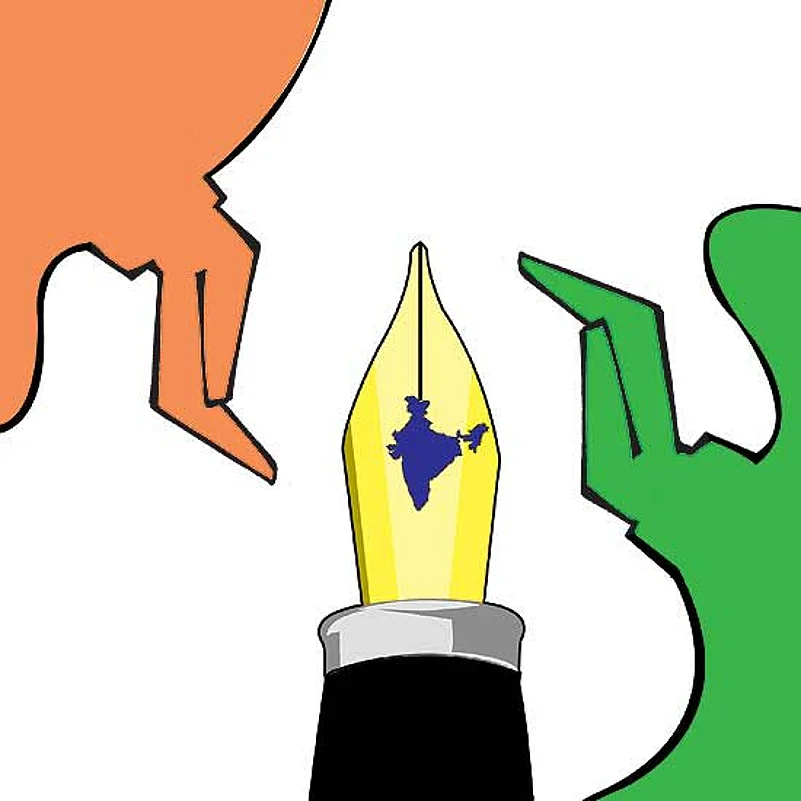Last week, an eminent spokesperson of the Indian national project of secularism, Girish Karnad, berated a Nobel laureate and an organisation that had honoured him. Karnad, a progenitor of this 65-year-old republic’s theatre, allowed himself a few personal digs but the crux of his argument was cultural: Naipaul’s pro-Hindutva pronouncements spring from his inability to appreciate the Islamicate contribution to Indian culture. I agree completely. Nonetheless, as I read about Naipaul’s “insensitivity to the intricate interweaving of Hindu and Muslim creativities, through the Bhakti and Sufi movements, that gave us this extraordinary heritage, alive in the heart of every Indian home...,” I found myself sighing.
I am not an adversary of Karnad’s way of thinking. I didn’t have an option when it came to the Indian national secular project. It was injected into me at an early age along with various WHO-approved vaccines. It is—to use a horrible empty signifier—my identity. I am Girish Karnad’s fellow traveller in that respect. If someone now wants to call me Comrade Bagchi, I will not stop them from doing so. By the time the ’90s finished, I had already decided that I was a card-carrying pseudo-secularist for life, and there wasn’t much I could do about it.
But as we near the 20th anniversary of the razing of Babri Masjid and the 30th anniversary of the Delhi riots, I have to say that I am beginning to feel that India’s secular experiment is suffering because of its poor design. It is suffering because it uses sanctimoniousness as its primary register. This register and what is said in it hasn’t changed from the good old ’90s when listening to Nusrat Fateh Ali Khan felt like a political statement. Since that time we have all grown older. Several Hindu-themed channels are available on my television. Zee TV’s Urdu channel shows Quran quizzes presided over by a maulana with a henna-tinged beard. And the other day I found myself driving in the heart of India’s capital behind a car with Punjab plates. It’s numeric part was 1984, next to which was printed an English phrase: Never forget.
I am not saying Karnad should have remembered his manners and not attacked Naipaul at the literary festival. What else could he have done? Naipaul is an enemy of Indian secularism. In saying this, I am not automatically saying that Naipaul is an enemy of India, or the Indian state, or Indians. It is simply that he holds some views, consistently and cogently, that are irreconcilable with the ideas that underpin the Indian version of secularism. How could Karnad have countenanced this old enemy being honoured in his, Karnad’s, own backyard? It is not for me to rule on whether Naipaul’s disinterested intellectual formulations will win or whether the secular project will prevail, only history can rule on that. For me, I found it touching, and sad, to see that Karnad fell back on music to make his argument, that he still believes that the cultural argument will carry the day. I took some time to re-read Tughlaq before I sat down to write this and I found that it begins with a well-meaning king being duped by a trickster who realises that this king’s love of a quixotic notion of communal impartiality is a weakness. A Muslim poses as a dispossessed Brahmin, realising that if a Hindu sues the king then the king will happily lose the case to prove that he rules all his subjects fairly. This is a beautifully multi-layered fictional construction. It grows in depth and texture as one messy chapter after another of our history is written. The Girish Karnad who wrote this in 1962, 50 years ago, is better placed to critique the lazy formulations of our team, rather than reiterating a tired argument about the contributions of Islamic rulers to our shared culture. My heart hears his argument and my body feels it, but my mind bears witness that it has not helped us realise our secular ideal. We need to accept this now. Karnad’s erudition is immense, his contribution is unquestioned, but maybe he has forgotten what he clearly knew back in the ’60s: if language does not grow, it dies.
This is the point where to appear even-handed I should say something cutting about Naipaul. I am afraid I have to disappoint. Naipaul is a foreigner. My destiny is not tied to his. Unlike Karnad and myself, his world will not shatter into a million pieces if the Indian national secular project dies.
(Amitabha Bagchi is the author of the novel The Householder)
























